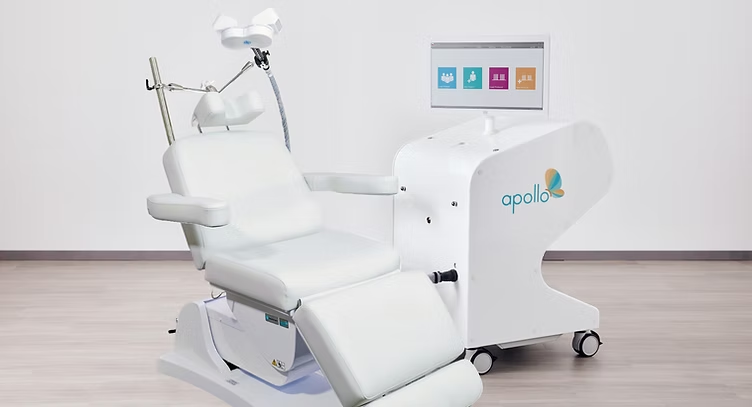What is TMS?
Transcranial Magnetic Stimulation (TMS) therapy is a revolutionary, non-invasive, and drug-free treatment for depression. TMS has proven effective for individuals who haven’t found relief with traditional antidepressant medications. This innovative approach significantly reduces symptoms in patients with treatment-resistant depression, and many achieve full remission, living symptom-free.
How does TMS help depression?
Depression often involves reduced activity in certain areas of the brain. TMS uses magnetic pulses to stimulate targeted brain regions, causing neurons to fire. By focusing on areas associated with mood regulation, TMS can improve symptoms, helping patients feel more engaged in their lives and relationships and fostering a more optimistic outlook on the future.
What’s involved in TMS therapy sessions?
TMS therapy typically involves five sessions per week over four to six weeks. During a session, a small electromagnetic coil is placed gently on the patient’s head. Magnetic pulses are delivered painlessly, stimulating specific areas of the brain through a computer-guided program. Patients often relax, listen to music, or rest during the session, which lasts about 20-40 minutes.
Does TMS hurt?
TMS therapy is generally pain-free. Some patients describe a tapping sensation on the scalp or mild facial twitching during treatment, caused by the magnetic pulses. These sensations are temporary and typically subside immediately after the session. Most patients find any discomfort minimal and easily tolerable.
How long does it take for TMS to work?
The timeline for noticeable results varies. Younger patients and those combining TMS with antidepressant medication may see improvements within two weeks. For others, results may take longer, but TMS remains highly effective for long-term symptom relief. Completing the full course of treatment is essential for optimal outcomes.
What are the side effects associated with TMS?
Most patients experience no side effects. However, some report mild headaches or tingling sensations in the jaw, face, or scalp. These effects usually diminish within a few weeks and are rarely severe enough to interrupt treatment.
Does insurance cover TMS treatments?
Yes! Most insurance plans cover TMS therapy. Our intake specialists can help you navigate your specific plan and provide detailed information.
Is TMS compatible with depression medication?
TMS can be used alongside antidepressant medications or as a standalone treatment. While some patients find TMS alleviates symptoms enough to discontinue medication, others experience enhanced medication effectiveness. Discussing your options with a qualified mental health professional is essential to determine the best approach for you.
How do I know if I’m a good candidate for TMS?
The best way to determine if TMS is right for you is through a consultation with a mental health practitioner. TMS is often recommended for individuals with treatment-resistant depression who haven’t responded to traditional therapies. Candidates may not include those with implanted medical devices, a history of seizures, or certain brain injuries. While not every candidate achieves full remission, many experience significant symptom relief.
Advanced TMS therapy at NuBalance Behavioral Health Services
If you or a loved one is struggling with depression that hasn’t improved with standard treatments, TMS therapy could be the solution. At NuBalance Behavioral Health Services, our experienced team provides personalized evaluations, considering your symptoms, medical history, and unique needs. We prioritize holistic, individualized care to help you achieve optimal mental health.
Contact us. We are here to help!
Take the first step toward relief and recovery. Call today at 610-466-5335 or email us at info@NuBalanceTMS.com to schedule your consultation.

